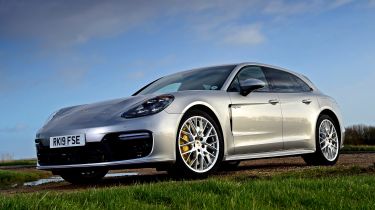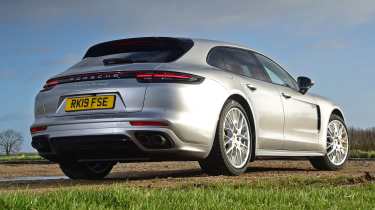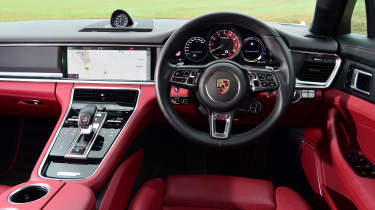Used Porsche Panamera (Mk2, 2016-2023) buyer’s guide: pricey but won't disappoint
A full used buyer’s guide on the Porsche Panamera covering the Panamera Mk2 that’s was on sale between 2016 and 2023
Verdict
There’s a whole generation of car nuts who have grown up thinking of Porsche as a builder of family cars as much as sports cars, and when they’re as good as the Panamera (or the Macan and Cayenne), that’s understandable. Of course, the Panamera is expensive to run, and you could argue that it’s costly to buy, but in a world where the £40,000 Vauxhall Corsa exists, is this sleek five-door Porsche really that expensive? While running costs will be high, the Panamera is one of the most capable luxury cars at any price, and is superb to drive. Buy a nice one, look after it, and it’ll be all the car you could ever need.
For some enthusiasts, the only proper Porsche is a coupé with an engine in the back – even better if it’s an air-cooled flat-six. But Porsche moved on from there many years ago, with the mid-engined Boxster, the front-engined (and big-selling) Macan and Cayenne SUVs, plus the Panamera four-seat luxury saloon.
The latter was launched in 2009, and while its exterior design was challenging, the car sold well. The Panamera was such a success that an all-new model went on sale in 2016, with a sleeker exterior, more efficient engines, a much-improved interior and even greater dynamic abilities. The Mk2 was so good that the Mk3, which has just been launched, is in effect a comprehensive update, rather than an all-new model.
History
The Mk2 Panamera arrived in November 2016. On offer were the 434bhp 2.9 V6 4S, the 542bhp 4.8 V8 Turbo and the 416bhp 4.0 V8 4S Diesel. The 455bhp Panamera 4 E-Hybrid plug-in hybrid joined the range soon after, with a 2.9-litre V6 petrol engine.
In the summer of 2018, the Turbo S E-Hybrid arrived, packing a 4.0-litre V8 engine and a monstrous 680bhp. This version was launched alongside the Sport Turismo shooting brake with the same powertrain options, then in December 2018 came the GTS, with a 434bhp 4.8 V8.
Used - available now

2020 Porsche
Panamera
59,830 milesAutomaticPetrol4.0L
Cash £48,995
2023 Porsche
Panamera
22,752 milesAutomaticPetrol4.0L
Cash £71,800
2023 Porsche
Panamera
59,760 milesAutomaticPetrol2.9L
Cash £48,995
2020 Porsche
Panamera
75,420 milesAutomaticPetrol4.0L
Cash £44,995A facelift in September 2020 saw the 611bhp Turbo S replace the Turbo, the GTS gain 19bhp, and the 544bhp 4S E-Hybrid join the line-up. The Panamera’s exterior design was refreshed, and Porsche boosted the equipment levels, too.
Which one should I buy?
The Panamera Diesel is a fabulous car and one that’s well worth considering, but it’s very rare, so you’ll have to search hard to buy one. That leaves the option of either a petrol model or a plug-in hybrid; both of these are superb to drive and have lots of power. Even the entry-level 3.0-litre V6 petrol edition has 325bhp and more than enough performance. After that you just get greater power and bigger bills, so buy according to the depth of your pockets.
The E-Hybrids can be relatively frugal, but how you drive them and the type of journeys that you undertake make a huge difference to fuel economy and therefore running costs. And don’t overlook the Sport Turismo, which is as good as the hatch in every way, but usefully more practical.
Alternatives to the Porsche Panamera
The Audi A7, S7 and RS 7 are the Panamera’s only true rivals in that they offer five-door hatchback practicality with plenty of performance and cutting-edge tech. While Audi’s trio is great to live with, they are not as enjoyable to drive as the Porsche. The Mercedes CLS and AMG GT four-door coupé are worthy adversaries, too, but because they are saloons, they don’t have the ultimate practicality of the Panamera, although there’s always the CLS shooting brake option.
The BMW 8 Series Gran Coupé is another luxurious coupé-like four-door saloon that’s superb to drive, hi-tech and searingly quick with the right engine. A more left-field option is the Maserati Quattroporte, which looks great and is fun to drive. Or how about an Aston Martin Rapide? Its V12 engine makes it more special than the Porsche, but it’s not as slick overall.
What to look for
Four-wheel drive
All Panameras come with the security of all-wheel drive, apart from the rear-wheel-drive Diesel and 3.0 V6 petrol.
Chassis
Air suspension wasn’t standard on entry-level models. Most examples do have it, but not all, and it’s well worth having for a small premium.
Models
The Sport Turismo estate model carried a £3k or so premium over the regular Panamera. On the used market the difference is a bit less.
Electric range
Porsche claimed that its hybrid Panameras could do around 38-40 miles on a full charge. Expect to get around 30 miles in the real world.
Common faults
You're going to pay plenty in insurance and fuel, while road tax will be steep if the example is less than six years old. Maintenance also tends to be expensive, but a good independent can help to slash costs here, without cutting quality or mucking up the service history.
Interior
Porsche didn’t skimp on the cabin materials, with plenty of leather trim, or Alcantara for the GTS. The dashboard features large digital displays and the infotainment is wonderfully slick.
Most Panameras are four-seaters (there was a five-seat option from 2018), but there’s space for adults in the back. The Sport Turismo is even better in this respect, while Porsche also offered an Executive saloon with a wheelbase extended by 150mm.
Boot capacity is 500 litres, or 1,340 litres with the back seats folded; the Sport Turismo offers 520 or 1,390 litres.
Prices
Almost half of the cars for sale are plug-in hybrids, virtually all are V6s, but there are a few Turbo S E-Hybrids. Diesels are rare.
To check prices on a specific model head over to our valuation tool.
Running costs
The Panamera needs to be serviced every two years or 20,000 miles, although Porsche recommends an annual check. An oil and filter change (along with a check-over of the car) costs £691. Get the brake fluid changed (due every two years) and this adds £159 to the bill, while fresh spark plugs are needed every four years, and Porsche charges £486 to replace these.
A change of oil for the rear differential is needed every 12 years or 120,000 miles, at a cost of £327, while the automatic gearbox oil has to be renewed every six years or 60,000 miles, at £616. There’s no set schedule to replace the coolant, and because the Panamera’s various engines are all chain driven, there are no cambelts to replace. All Panameras come with a three-year warranty as standard, which can be extended by up to 15 years.
Recalls
The Panamera Mk2 has been recalled 11 times, first in July 2017 because of faulty exhausts. There were three campaigns in 2018: accelerator pedal glitches (April), rear suspension problems (June) and failure of the electric power steering (December), and there were four in 2019. These centred on faulty brake pad wear software (March and November) and damaged power steering wiring (June), while the November campaign was because of excessive exhaust emissions.
There was one recall in 2021, due to sub-standard front suspension parts, and two actions were issued in 2023. The first came in April because of water getting into the climate-control system, leading to short circuits, while in July a campaign was launched because some rear seatbelts weren’t installed correctly.
Driver Power owner satisfaction
Porsche doesn’t sell enough Panameras for the model to get into our Driver Power surveys. The firm has just 0.75 per cent of the UK market, but that didn’t stop it coming top in our 2021 Brands survey. Porsche repeated the feat in 2022 and 2023, thanks to finishing first in the exterior, ride and handling, reliability and infotainment categories. It’s only value for money and running costs where things fall down.













